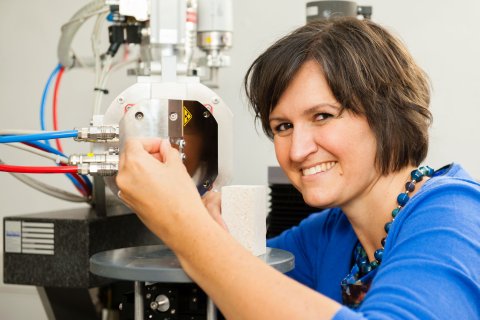Veerle Cnudde appointed as professor of Porous Media Imaging Techniques
As of February 1, 2019, Prof. Dr Veerle Cnudde is appointed as part-time professor on the chair of Porous Media Imaging Techniques in the Environmental Hydrogeology group of the Department of Earth Sciences. The new part-time chair complements and strengthens the profile of the department with directions that are indispensable for pore-scale network modelling and upscaling.

The appointment of Veerle Cnudde builds on already existing collaborations between Ghent University, her other employer, and Utrecht University in this field, in particular with the Hydrogeology group and the Experimental Rock Deformation group.
At UGhent, Veerle Cnudde is the teamleader of PProGRess, the Pore-scale Processes in Geomaterials Research group, where various dynamic processes inside the pore space of geomaterials are studied and imaged. The group specialises in non-destructive imaging of the 3D structure of all kinds of materials, from the nano- to macro-scale and wants to stretch the limits in terms of both temporal and spatial resolution, for real-time imaging of processes in the pore space of geomaterials. The stronger involvement of Prof. Cnudde at Utrecht University offers new opportunities for collaboration, also with other research groups inside and outside the Department of Earth Sciences.
Studying porous media
Subsurface flow and transport processes in porous media play an important role in modern society. Typical examples are e.g. transport of contaminants in the subsurface (including remediation techniques), seawater intrusion, production of drinking water and energy resources, production of geothermal energy, storage of seasonal thermal energy in the shallow subsurface, storage of CO2, storage or nuclear waste in geological formations, and weathering of our cultural heritage (e.g. buildings, statues). All these processes acquire a fundamental understanding of the fluid flow in these porous structures as well as a detailed understanding of the processes occurring at the pore scale.
Research in the Hydrogeology group is directed towards understanding and quantifying the link between micro-scale and field-scale behaviours. Pore-scale studies are combined with with column- and field-scale observations, and analogue modelling with numerical modelling. This comprises imaging and characterisation of earth materials using a wide range of destructive and non-destructive imaging methods.
Along with computational expertise, the group has developed the Multiscale Porous Media Lab which is a state-of-the-art experimental facility for performing research on complex and coupled multiphase flow and reactive transport in porous materials. The results can be used to analyse and characterise the flow and transport behaviour of real-world earth materials, using pore-scale network models or micro-model experiments in the laboratory. This is also where the natural link to work in the Experimental Rock Deformation group occurs (HPT-lab). Additionally, much of the knowledge developed in the geosciences with respect to flow and transport in porous earth materials can successfully be applied in biological and man-made porous media applications.

